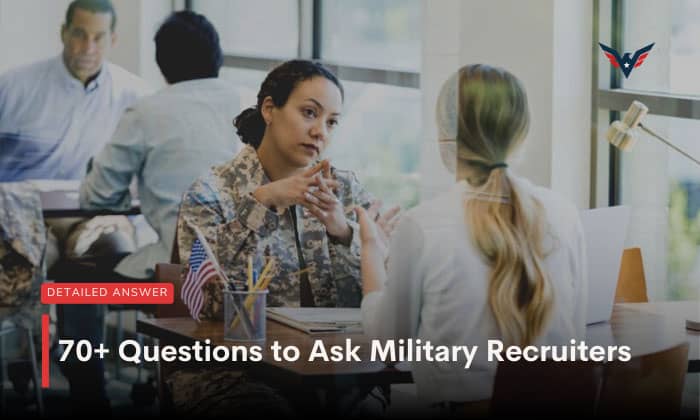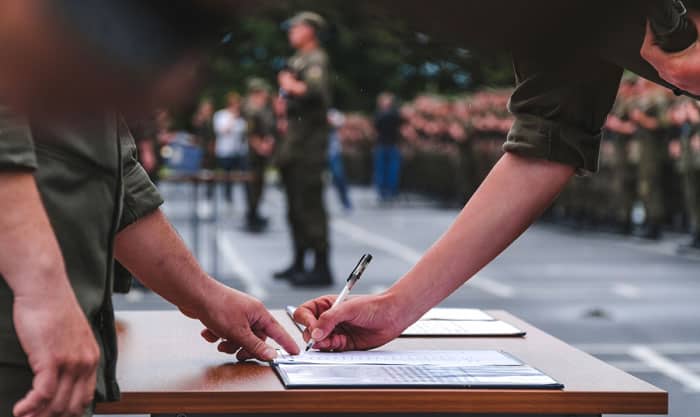Joining the military is not a decision you can make on a whim. Before committing to service, you should have all the information you need, and you get it by sitting down with a military recruiter
Below, we have a list of good questions to ask a military recruiter that you can consider. If you have an appointment coming up, it can help you prepare.
We recommend filtering out those you already have the answers to and creating your own set of questions to ask your recruiter.
Table of Contents
Good Questions to Ask Military Recruiters
We have categorized the following military questions to ask recruiters so you can easily plan when and how to bring up certain things for the first time.
1. General
Below are questions you can ask recruiters from any service branch, be it a Marine recruiter or an Air Force recruiter.
- Can I choose my service branch?
Yes. You can pick the branch you will be serving in. To make this decision, consider the branches’ missions, requirements, benefits, etc. You can choose to be in the Army, Air Force, Marine Corps, Navy, or Coast Guard.
- Do I have to turn in my medical history and related records?
Yes. You will have to provide these at the Military Entrance Processing Stations (MEPS). It is specifically needed during medical screening.
- What are the entrance requirements I need to meet?
You need to be at least 17 years old, a U.S. citizen, and a high school graduate. You will also have to pass a physical screening test and the ASVAB.
- Are there signing bonuses?
Yes. But this varies from base to base. How much you are entitled will also depend on the specialty that you register for, your educational level, civilian experience, etc.
- How long is basic training?
It is about 7.5 weeks long for the Air Force, 8 weeks for the Coast Guard, 10 weeks for the Army and Navy. and 13 for the Marine Corps.
- Can I fail basic training?
Yes. You can fail basic training. 15 percent of recruits actually fail to pass basic training each year.
- What happens after basic training?
After you graduate from basic training, you will have advanced individual training (AIT).
2. Service Branches
Questions to ask Army recruiters:
-
- Do I have to go to war?
Not necessarily. Whether you go to war depends on the specific job that you will take, as well as if there will be wars to take part in. If you are worried about having to go to the frontline, choose to specialize in positions that are behind the scenes.
-
- How many jobs are there?
There are more than 200 jobs. You can learn more about them from the Army’s website.
Questions to ask National Guard recruiters:
-
- How is the National Guard different from the active duty force?
If you are in the National Guard, you are not working for the military full-time. However, you must still set out for deployments when you are called to.
-
- What are my commitments as a member of the National Guard?
You must participate in drills one weekend every month and two weeks every year. Plus, you will have to deploy when the military requires you to do so.
Question to ask a Navy recruiter
-
- Will I get liberty time? If yes, how long?
Yes, you certainly will get liberty time. The length will vary depending on the exact type of liberty time. For regular and special liberty, you’ll get at most 3 and 4 days, respectively.
-
- Will I be stationed on a ship?
It’s unlikely you’ll have to spend all your career on the sea. However, be prepared to spend 6-9 months on the sea, be it for deployment or training. Such occasion can arise every 1-2 years.
Questions to ask an Air Force recruiter
-
- Will I be stationed in foreign countries?
Numerous criteria determine where a US Air Force recruit will be stationed. The recruiter will think about things like the given job specialty, training needs, and the requirements of the Air Force at the time of their enrollment, to mention a few.
As a result, recruits may be sent to the Air Force bases, which may be located both domestically and internationally.
-
- Can I take my loved ones with me if I’m deployed in foreign countries?
Unfortunately, the answer is no unless you’re married and have children. Otherwise, be prepared that you’ll have to go abroad alone.
-
- How likely can I become a pilot?
To be clear from the get-go, the competition for the pilot position is insanely tough. That said, you may have a better chance if the number of vacant posts is high (which is quite unlikely).
3. Education
Your educational background will play a role in whether you will qualify for service. Therefore, it is necessary to ask questions about this topic. Here are some of the things you can inquire about:
- Can I join the military without a degree?
You need to have a high school degree to enlist in the military. Sometimes a GED might be acceptable, but it is not a guarantee.
- What does the Armed Services Vocational Aptitude Battery (ASVAB) assess?
The ASVAB assesses whether you are fit for the military by measuring your strengths and success potential.
- What is the lowest score I need on the Armed Services Vocational Aptitude Battery (ASVAB)?
You need a minimum of 31 for the Army, 36 for the Air Force, 32 for the Marine Corps, 35 for the Navy, and 40 for the Coast Guard.
- Can I earn a degree while I am serving?
Yes. You can. You can take on-base classes, online classes, or classes at a branch campus.
- Does the military offer education support?
Yes! The military has various education benefits on offer. For example, there is the Post 9/11 GI Bill, the Montgomery GI Bill, the Tuition Assistance Top-Up Program, etc.
4. Lifestyle
This is another aspect that you cannot overlook. It is entirely different from the civilian world, so asking smart questions about it can help you prepare. Several questions you can get started with are:
- Do I have to live on base?
You must stay on base in barracks while you are in basic and advanced training. But you will have the option to move off base afterward.
- How long is a deployment?
There is no standard length of deployment. It depends on the nature of the deployment, as well as your service branch, job, and rank. Deployments can be as short as two months and as long as several years.
Frequently Asked Questions (FAQs)
What to wear when seeing a military recruiter?
The key is to look well-presented but not over-the-top. Think smart casual or business casual.
For example, you can wear a button-down shirt or a polo. Pair it with a pair of plain slacks or a skirt. Add a simple blazer if you want to appear slightly more professional.
We suggest sticking to soft colors, like white, beige, gray, so you do not appear harsh on the eyes.
You do not need accessories, but a belt, watch, or necklace will not hurt. Avoid those that make a lot of noise or give off a tacky vibe. It is a good idea to carry a simple bag for your belongings. A tote or backpack will do.
Find more in our other article on “What To Wear When Meeting a Military Recruiter”
What should I not wear?
Do not wear anything too revealing or offensive. This includes in-style torn clothes, flip-flops, and dark-joke graphics.
You should avoid fluorescent, sequins, feathers, and fur. While fancy, these are not appropriate for a meeting with military recruiters. Save them for your weekend parties.
Plus, if you are sitting down with a recruiter from a specific service branch, make sure you are not wearing something from a different branch.
What should I bring?
You should carry a notepad or something similar to jot down the answers to your questions. This will come in handy when you are back on your sofa reflecting on your meeting and whether you are fit for the military. By the same token, have a pen, pencil, or marker to write with.
What not to say to a military recruiter?
- It goes with saying that you should keep your dialogue respectful. Do not cross the line with any offensive remarks.
- Ensure you are not basing the conversation around military or branch stereotypes. For instance, don’t mention anything about military memes you see on Reddit.
- Informal ways of addressing others like “dude,” “bruh,” “dawg,” “girl,” should be avoided.
- Do not stray from the truth when military recruiters ask you questions. They WILL find out that you are lying, and this will surely not sit right with the values of the service.
- And the final no-no is profanity. Keep your language clean!
Conclusion
Knowing what to ask beforehand will help you make the most out of your sit-downs with military recruiters. And asking good questions ensures you will be well informed to make a decision about enlisting or commissioning. So, we hope that the 70 questions to ask military recruiters we provided above makes preparations easier for you.
If you have additional related inquiries, reach out to us in the comments. You can also check our other blog posts on this topic!

I am Everett Bledsoe, taking on the responsibility of content producer for The Soldiers Project. My purpose in this project is to give honest reviews on the gear utilized and tested over time. Of course, you cannot go wrong when checking out our package of information and guide, too, as they come from reliable sources and years of experience.









